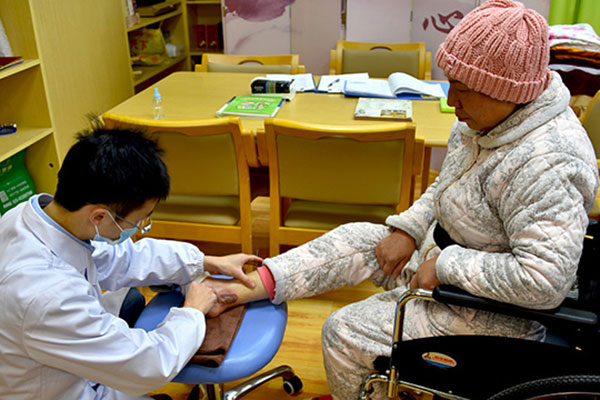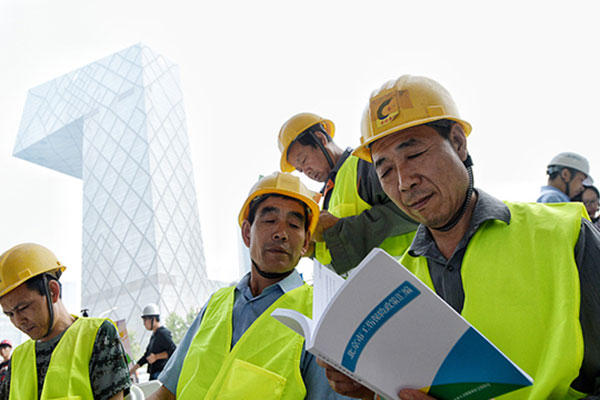Weekly policies concerning people’s lives
2017-09-03
english.gov.cn
China to further reform to drive innovation
China will step up reform to support innovation by removing barriers to entrepreneurship and innovation.
The decision was made at a State Council executive meeting chaired by Premier Li Keqiang on Aug 30.
Those at the meeting decided that the government will roll out a host of reform measures that have been piloted in eight areas, including the Beijing-Tianjin-Hebei region, Shanghai and the Pearl River Delta, since June 2016.
Eligible foreign students with academic backgrounds equal to or above master’s degree could apply for a work permit or work-related residence permit. The one-stop application and issuance of work permits for foreign experts also will be made available nationwide.
Details:>>China to further reform to drive innovation
China mulls greater support to healthcare industry
The Chinese government plans to further promote the development of the healthcare industry to meet the needs of the rapidly growing elderly population.
Healthcare development is a key part of the country’s supply-side structural reform and crucial to addressing people’s needs, a statement released after a State Council executive meeting presided over by Premier Li Keqiang on Aug 30 said.
Key tasks, including setting up an action plan for healthcare industry development and streamlining administrative approvals for establishment of medical and elder care institutions were detailed at the meeting.
Details:>> China mulls greater support to healthcare industry
China begins development of rural land for rental housing
China will allow the development of rental housing projects on rural land on a trial basis, authorities said on Aug 28.
Rural collective economic organizations can build and rent housing on rural construction land by themselves or through joint ventures, according to the Ministry of Land and Resources and the Ministry of Housing and Urban-Rural Development.
The program will be tested in 13 cities, including Beijing, Guangzhou and Shanghai, with many projects envisaged by the end of 2020, before expansion elsewhere.
The move is an attempt to increase rental options and establish a housing system that is fair to both owners and tenants.
Details:>> China begins development of rural land for rental housing
Provincial collection for fund of work injury insurance
According to a circular released by the ministries of human resources and finance, the coverage, tariffs, injury identification, payment standards, and information system of work injury insurance will be unified.
Meanwhile, eligible regions can practice collective collection and spending for funds of work injury insurance, or set up a regulation fund account at the provincial level.
Cuts to nonresidential natural gas price
China’s top economic planner has cut the price of natural gas for nonresidential users to ease the burden on downstream industry players.
From Sept 1, the benchmark price at urban natural gas stations for nonresidential use would be cut by 100 yuan (about $15.12) per thousand cubic meters, the National Development and Reform Commission (NDRC) announced on Aug 30.
The move will save 7 billion yuan each year for industrial users, power generation companies, central heating suppliers, taxi drivers, commercial entities, service providers and other downstream entities, the NDRC said.
Nonresidential use takes 80 percent of China’s natural gas consumption. The price cut is expected to be reduced by 16 billion yuan for gas users.
Details:>> China cuts nonresidential natural gas price
Reform of SOE-managed education and medical institutions to be completed
According to a joint circular released by the State-owned Assets Supervision and Administration Commission, ministries of education, finance, and human resources, National Health and Family Planning Commission, and State Commission Office of Public Sectors Reform, the reform of education and medical institutions managed by State-owned enterprises (SOE) will be completed by the end of 2018.
SOEs are encouraged to continue management of vocational colleges, and transfer ordinary schools (preschool education, primary and middle schools, and universities) to local authorities.
Medical institutions run by SOEs shall be collectively run on a nonprofit principle.
New textbooks for compulsory education
New textbooks for Chinese, history, and laws for compulsory education were applied nationwide on Sept 1.
Compiled by the Ministry of Education, the textbooks will be used for all the grades from primary to middle schools in 2019.









